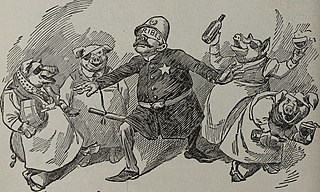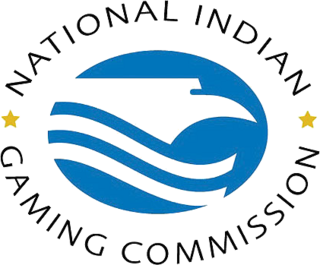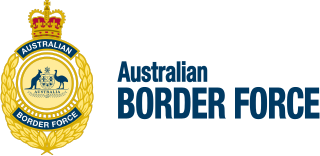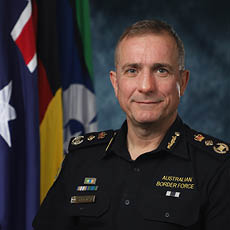| Statutory agency overview | |
|---|---|
| Formed | 30 December 2006 |
| Dissolved | 2023 (expected) |
| Superseding agency | |
| Jurisdiction | Commonwealth of Australia |
| Headquarters | Canberra, Australian Capital Territory |
| Employees | 53 (2018) [1] |
| Website | www |
The Australian Commission for Law Enforcement Integrity (ACLEI) is an Australian government statutory agency, created under the Law Enforcement Integrity Commissioner Act 2006. [2] Its role is to support the Law Enforcement Integrity Commissioner, detecting and preventing corruption in the Australian Criminal Intelligence Commission, the Department of Home Affairs (Australia) including the Australian Border Force (ABF), the Australian Federal Police, Australian Transaction Reports and Analysis Centre (AUSTRAC) and aspects of the Department of Agriculture and Water Resources. [3]
The minister responsible for the agency is Mark Dreyfus, Attorney-General. [3] ACLEI is headed by an Integrity Commissioner.
Priority is given to investigations of serious and systemic corruption. ACLEI supports the Integrity Commissioner by collecting intelligence regarding corruption. The Integrity Commissioner is required to make recommendation to the federal government regarding improvements to legislation that will prevent corrupt practices or their early detection. [3] Its role is far more limited than proposals for a National Anti-Corruption Commission. [4]

The Federal Bureau of Investigation (FBI) is the domestic intelligence and security service of the United States and its principal federal law enforcement agency. Operating under the jurisdiction of the United States Department of Justice, the FBI is also a member of the U.S. Intelligence Community and reports to both the Attorney General and the Director of National Intelligence. A leading U.S. counterterrorism, counterintelligence, and criminal investigative organization, the FBI has jurisdiction over violations of more than 200 categories of federal crimes.

The Australian Federal Police (AFP) is the national and principal federal law enforcement agency of the Australian Government with the unique role of investigating crime and protecting the national security of the Commonwealth of Australia. The AFP is an independent agency of the Attorney-General's Department and is responsible to the Attorney-General and accountable to the Parliament of Australia. As of October 2019 the Commissioner of the Australian Federal Police is Reece Kershaw, formerly the Northern Territory Police Commissioner.
The Australian Competition and Consumer Commission (ACCC) is the chief competition regulator of the Government of Australia, located within the Department of the Treasury. It was established in 1995 with the amalgamation of the Australian Trade Practices Commission and the Prices Surveillance Authority to administer the Trade Practices Act 1974, which was renamed the Competition and Consumer Act 2010 on 1 January 2011. The ACCC's mandate is to protect consumer rights and business rights and obligations, to perform industry regulation and price monitoring, and to prevent illegal anti-competitive behaviour.

Police corruption is a form of police misconduct in which law enforcement officers end up breaking their political contract and abuse their power for personal gain. This type of corruption may involve one or a group of officers. Internal police corruption is a challenge to public trust, cohesion of departmental policies, human rights and legal violations involving serious consequences. Police corruption can take many forms, such as bribery.

Law enforcement in Australia is one of the three major components of the country's justice system, along with courts and corrections. Law enforcement officers are employed by all three levels of government – federal, state/territory, and local.

The Australian Criminal Intelligence Commission (ACIC) is a law enforcement agency established by the Australian federal government on 1 July 2016, following the merger of the Australian Crime Commission (ACC) and CrimTrac. It has specialist investigative capabilities and delivers and maintains national information sharing systems. ACIC is part of the National Intelligence Community.

The Independent Commission Against Corruption (ICAC) is an agency of the Government of New South Wales responsible for eliminating and investigating corrupt activities and enhancing the integrity of the state's public administration. The Commission was established in 1989, pursuant to the Independent Commission Against Corruption Act, 1988 (NSW), modeled after the ICAC in Hong Kong.
Australian Transaction Reports and Analysis Centre (AUSTRAC) is an Australian government financial intelligence agency responsible for monitoring financial transactions to identify money laundering, organised crime, tax evasion, welfare fraud and terrorism financing. AUSTRAC was established in 1989 under the Financial Transaction Reports Act 1988. It implements in Australia the recommendations of the Financial Action Task Force on Money Laundering (FATF), which Australia joined in 1990.
The Australian Intelligence Community (AIC) and the National Intelligence Community (NIC) or National Security Community of the Australian Government are the collectives of statutory intelligence agencies, policy departments, and other government agencies concerned with protecting and advancing the national security and national interests of the Commonwealth of Australia. The intelligence and security agencies of the Australian Government have evolved since the Second World War and the Cold War and saw transformation and expansion during the Global War on Terrorism with military deployments in Afghanistan, Iraq and against ISIS in Syria. Key international and national security issues for the Australian Intelligence Community include terrorism and violent extremism, cybersecurity, transnational crime, the rise of China, and Pacific regional security.

Law enforcement in Malaysia is performed by numerous law enforcement agencies and generally comes under the direct purview of the Royal Malaysia Police, the main government agency entrusted with the maintenance of law and order in the country. Like many federal nations, the nature of the Constitution of Malaysia mandates law and order as a subject of the state, therefore the bulk of the policing lies with the respective states and territories of Malaysia.

The National Indian Gaming Commission is a United States federal regulatory agency within the Department of the Interior. Congress established the agency pursuant to the Indian Gaming Regulatory Act in 1988.
The Office of Police Integrity (OPI) was the Australian state of Victoria independent police oversight and anti-corruption agency established by the Victorian Government in November 2004. OPI ceased operation on 9 February 2013 and was replaced by the Independent Broad-based Anti-corruption Commission (IBAC). OPI's official role was to detect, investigate and prevent police corruption and serious misconduct and to ensure that police members had regard to the human rights set out in the Victorian Charter of Human Rights and Responsibilities.

The Australian Federal Police Association (AFPA) is a registered Industrial Organisation under the Fair Work Act 2009 operating as a Branch of the Police Federation of Australia. The AFPA has sole autonomous political and industrial coverage for all employees within the Australian Federal Police which includes sworn Federal Agents; Police Officers; Protective Service Officers; and non-sworn support staff deployed nationally and overseas. The Australian Federal Police Association also provides industrial coverage for the Australian Crime Commission and the Australian Commission for Law Enforcement Integrity.
Ombudsmen in Australia are independent agencies who assist when a dispute arises between individuals and industry bodies or government agencies. Government ombudsman services are free to the public, like many other ombudsman and dispute resolution services, and are a means of resolving disputes outside of the court systems. Australia has an ombudsman assigned for each state; as well as an ombudsman for the Commonwealth of Australia. As laws differ between states just one process, or policy, cannot be used across the Commonwealth. All government bodies are within the jurisdiction of the ombudsman.

Corruption is rife in Papua New Guinea (PNG). According to The Economist, "PNG's governments are notorious for corruption, and ever run the risk of turning the state into a fully-fledged kleptocracy".

Corruption can take many forms, and can distort how public policy is made or implemented. This article discusses the responsibilities of the various agencies involved in combating corruption in Australia. While Australia is a wealthy democracy, over the decade since 2012, Australia's ranking in the Corruption Perceptions Index from Transparency International has slipped from 7th place in 2012 to 18th in 2022 on a scale where a more honest public sector receives a lower rank. Additionally, there is a public perception that corruption in Australia is increasing. All states have broad-based anti-corruption agencies, and a national anti-corruption commission has been legislated by the Commonwealth government, and is to be put in place by mid-2023.

The Australian Border Force (ABF) is a federal law enforcement agency, part of the Department of Home Affairs, responsible for offshore and onshore border enforcement, investigations, compliance and detention operations in Australia. Through the ABFs Marine Unit, the ABF performs Coast Guard and marine law enforcement duties and is a component of the Maritime Border Command. The ABF is also part of the National Intelligence Community and is an active member of the World Customs Organization.

The Telecommunications Amendment Act 2015(Cth) is an Act of the Parliament of Australia that amends the Telecommunications Act 1979 and the Telecommunications Act 1997 to introduce a statutory obligation for Australian telecommunication service providers (TSPs) to retain, for a period of two years, particular types of telecommunications data (metadata) and introduces certain reforms to the regimes applying to the access of stored communications and telecommunications data under the original Act.
The National Anti-Corruption Commission, often shortened to the NACC, is an Australian federal integrity commission being established by the Albanese government. The commission is expected to be finalised by mid-2023.

Michael Outram is an Australian law enforcement officer and the current Commissioner of the Australian Border Force. He has served as a law enforcement officer for over 30 years and previously served with the Australian Federal Police.